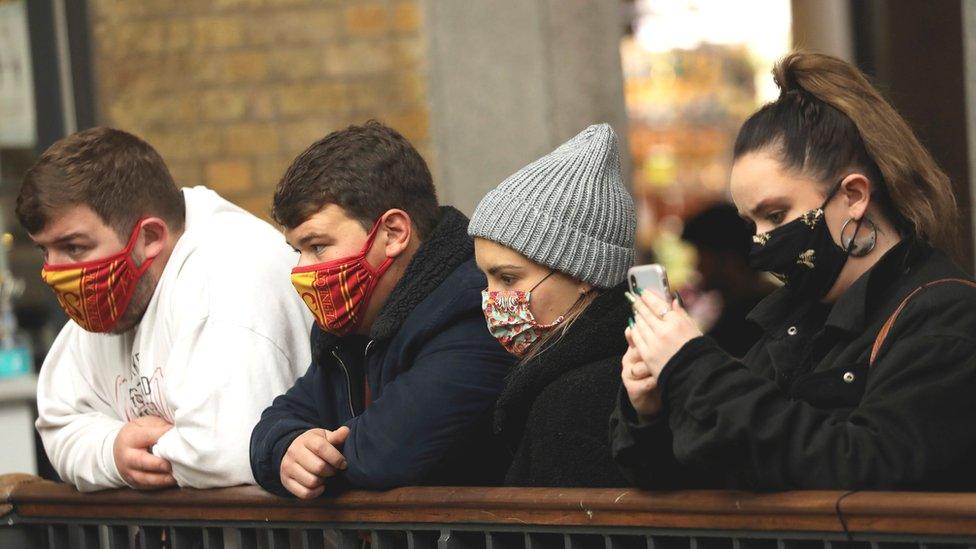Covid-19: Labour leader Sir Keir Starmer calls for circuit breaker
- Published
- comments
Sir Keir Starmer says a two to three week “circuit break” in England will require “significant sacrifices”
Labour leader Sir Keir Starmer has called for a short lockdown or "circuit-breaker" in England of two to three weeks to bring the rising rate of coronavirus under control.
He said measures were not working and another course was needed to prevent a "sleepwalk into... a bleak winter".
His comments come after documents revealed government scientific advisers called for such action three weeks ago.
Another 143 people have died in the UK after testing positive for the virus.
MPs have approved the legislation to write a new three-tier system for coronavirus restrictions in England into law - with every area of the country classified as being on medium, high or very high alert.
Sir Keir said his lockdown proposal would "not mean schools closing" but it should "run across half-term to minimise disruption".
However, he said it would mean that "all pubs, bars and restaurants would be closed" and compensated "so that no business loses out because of the sacrifices we all need to make".
"The government has not got a credible plan to slow infections. It has lost control of the virus and it's no longer following scientific advice," Sir Keir said.
He suggested it would also provide a chance for the government to "fix" problems by handing over track and trace responsibilities to local authorities.
Documents detailing advice from scientists, external on the government's Scientific Advisory Group for Emergencies (Sage) were released on Monday night. Their views and evidence feed into the government's decision making.
Sir Keir said his proposals were "in line with Sage's recommendation" for a circuit breaker to lower the reproduction number, or R value, of the virus - but acknowledged they would require significant sacrifices.
He said:
Only essential work and travel would be allowed and everyone who can work from home should do so
Non-essential offices should be closed
Household mixing should be restricted to one household except for those who have formed support bubbles
UK Parliament should "move to remote working"
Meanwhile, Wales' first minister has said he had asked Prime Minister Boris Johnson for a special Cobra meeting "specifically to discuss the circuit-breaker idea" earlier in the week - and repeated that call in a letter on Wednesday.
"I think it's an idea that will need further examination and needs to be shared in perspective between the four UK nations," Mark Drakeford added.
Mr Johnson has rejected Mr Drakeford's demand for a travel ban on people coming to Wales from England's virus hotspots.
Ministers in Northern Ireland's devolved government have been warned that Covid-19 infection rates will keep rising if both schools and the hospitality sector remain open, the BBC has learned.
The Scottish government is to implement its own three-tier framework of restrictions later in October. In the meantime, pubs and restaurants in Scotland's central belt, including Edinburgh and Glasgow, were closed on Friday until 25 October as part of a package of short-term measures.
'Hugely concerning'
The daily figure of 143 deaths follows 50 deaths announced on Monday and was the highest daily total since the 164 deaths recorded on 10 June.
The latest government figures, external also show another 17,234 people have tested positive for Covid in the UK, compared with 13,792 cases the day before.

Dr Yvonne Doyle, Public Health England's medical director, said the rising number of deaths was "hugely concerning".
"We have seen cases increasing especially in older age groups which is leading to more hospital admissions. This is a stark reminder for us to follow the guidelines," she said.


The Labour leader's call has added to the volume of demand for extra caution - marking the end of the phase of what he used to describe as constructive opposition.
Sir Keir Starmer has been inching away from the broad front bench consensus on how to handle coronavirus for weeks.
To the frustration of some on his own side, rather than scream down the government's plans he has developed an attack on the government's ability to handle the situation and to act quickly enough.
But his call for a circuit-breaker means he believes the government has simply got it wrong.
Polling suggests too that there is public desire for tougher action to prevent a terrible second wave. Some senior figures in government agree.

Health Secretary Matt Hancock earlier defended the new measures, telling MPs that Covid-19 posed "a formidable threat" until a vaccine can be found.
But he said the government makes "decisions that are guided by the science, taking into account all of the different considerations".
"Protecting our economy and protecting our health are not alternatives", he added, but said action was required to "protect lives and livelihoods".
Sir Keir said Labour would not vote against the measures - even though they did not go far enough.
"We are not going to vote down a package of restrictions because restrictions are needed," he said.
A senior government source branded Sir Keir a "shameless opportunist", saying he was "playing political games in the middle of a global pandemic".

THREE TIERS: How will the system work?
SOCIAL DISTANCING: How have rules on meeting friends changed?
FACE MASKS: When do I need to wear one?
TESTING: How do I get a virus test?
SUPPORT BUBBLES: What are they and who can be in yours?

The Liverpool region will enter a "very high" Covid alert level from Wednesday, the highest of the new three-tier system for coronavirus restrictions in England.
Most parts of England are on the lowest tier, but Essex has asked to be moved to "high" level restrictions.
Meanwhile, London could be put in a stricter lockdown within days, Mayor Sadiq Khan has warned.
The prime minister's official spokesman said the government examines a "wide range of different data" and takes advice from health experts before deciding which tier applies to an area.
"We look not only at infection rates but also the rate of positive tests, admissions to hospitals, and admissions to intensive care units," they said.
A committee of senior government health officials have been considering putting Greater Manchester and Lancashire into the highest level of restrictions and will hold a further meeting on Wednesday.
Andy Burnham, the Labour mayor of Greater Manchester, said the government "risks confusing people" in the region just days after it was put in the second highest tier, adding "unfunded restrictions are unfair".


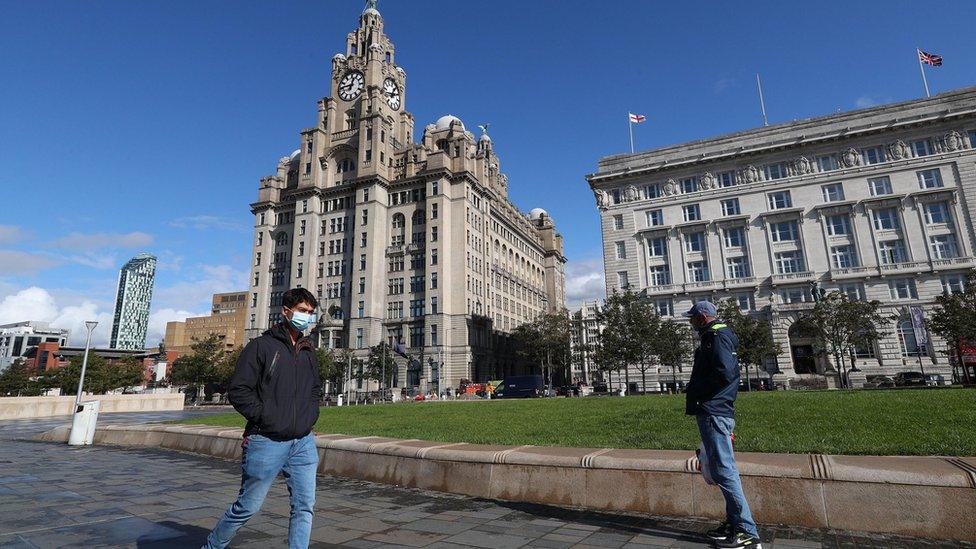
The highest tier of restrictions are set to come into force in Liverpool on Wednesday
In other developments:
The UK unemployment rate has surged to its highest level in over three years as the pandemic continues to hit jobs. A "disproportionate" number of people affected are aged between 16 and 24
People who were told to shield to protect themselves from coronavirus earlier in the year will receive a letter with tips on how to protect themselves from infection - but will not be told to shield again at the moment
The number of secondary schools in England sending home some pupils because of Covid is increasing rather than diminishing, the latest weekly figures from the Department for Education show
Conservative MP Chris Green has resigned as a parliamentary private secretary - criticising the restrictions in his Bolton West and Atherton constituency, external and saying there were "better alternatives to the government's approach". He wrote: "There is a healthy debate on how we can eliminate this coronavirus or how we can live with it and this is being led by many distinguished academics, epidemiologists and other specialists.
Police in Scotland have warned football fans not to cross the border into England this weekend in order to watch the Celtic v Rangers game in the pub


The 143 new deaths reported is clearly a concern.
It is the highest daily figure since early June and feels significant, even taking into account the impact of the delayed reporting at the weekend which often pushes up the figures on a Tuesday.
But to understand what is happening you have to rewind a month or so and look at cases.
Cases were rising rapidly then - it is what promoted the government's senior advisers to warn there could be 50,000 cases a day by mid-October.
That has not happened. Just over 17,000 were announced today.
The trajectory has not been as steep as it could have been.
We have seen a similar pattern happen with hospital admissions. They are rising, but over the last week the rate of increase has slowed just a little.
Deaths will, sadly, continue to go up in the coming days and weeks, but if the patterns seen with cases and hospital admissions are sustained those rises will slow too.
It is very, very different from the rapid surge we saw in the spring.
But a gradual and slow continual rise could still have a devastating impact over the long autumn and winter period.
That is why we are seeing politicians and scientists argue about what is the best way to contain the virus, while limiting the impact restrictions have on wider society and the economy.

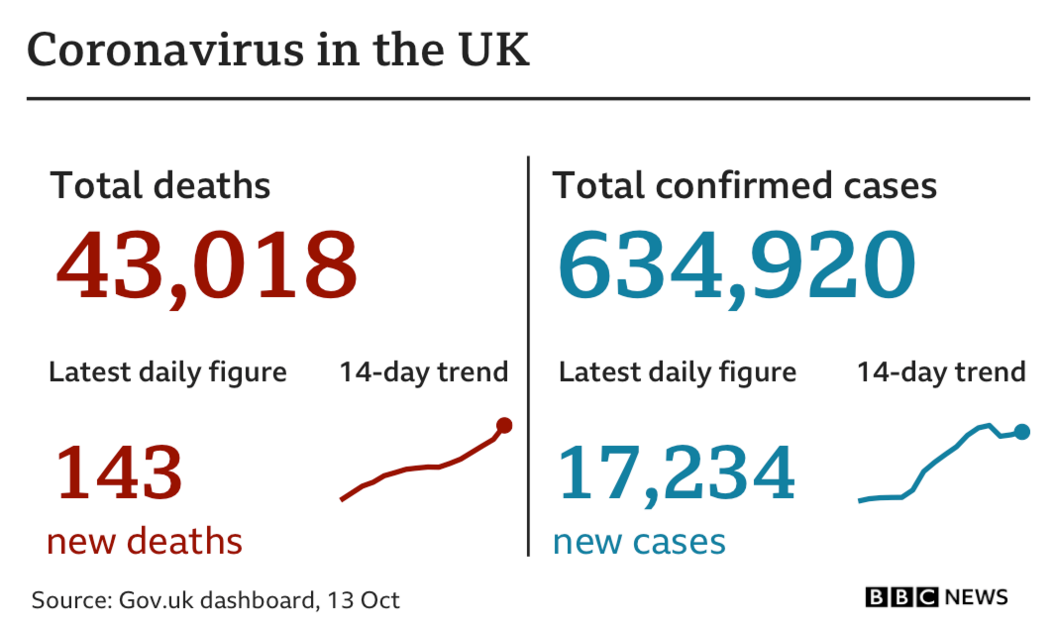

THE DELIGHTS OF COMMUNAL COOKING: How cooking kept me sane in university lockdown
IN NEED OF SOME ESCAPISM?: From the world of Doctor Foster comes Life, a brand new drama on BBC iPlayer

- Published13 October 2020
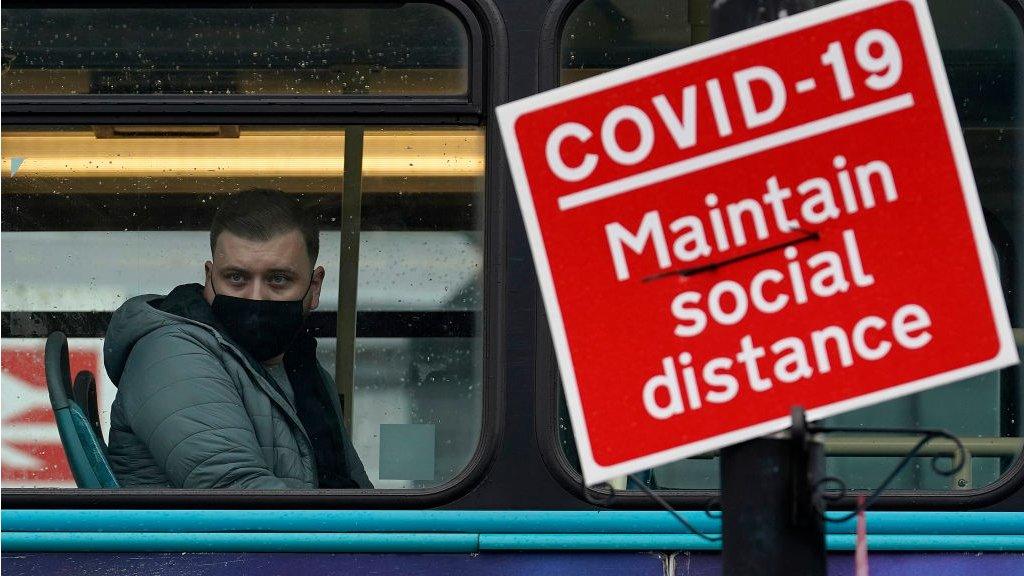
- Published1 July 2022

- Published13 October 2020
- Published26 January 2022
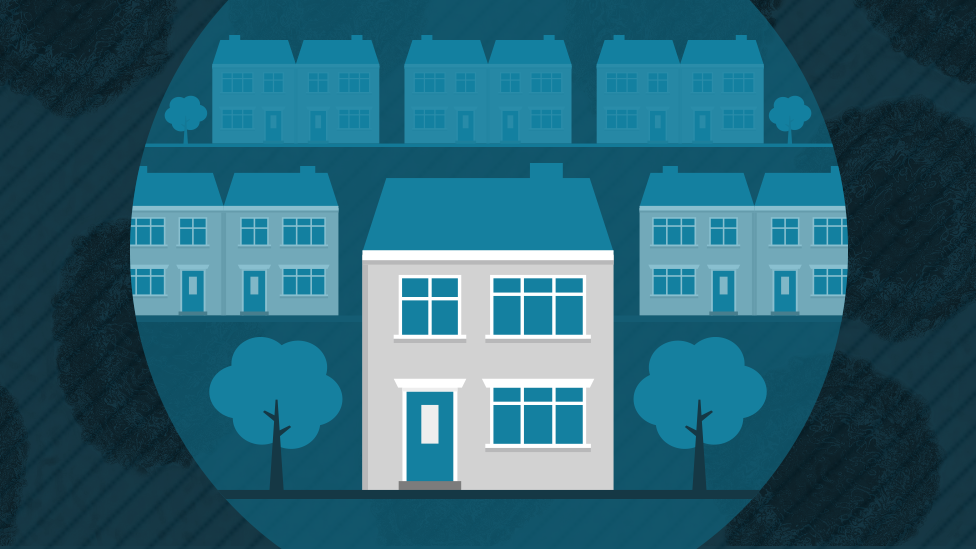
- Published20 November 2020
